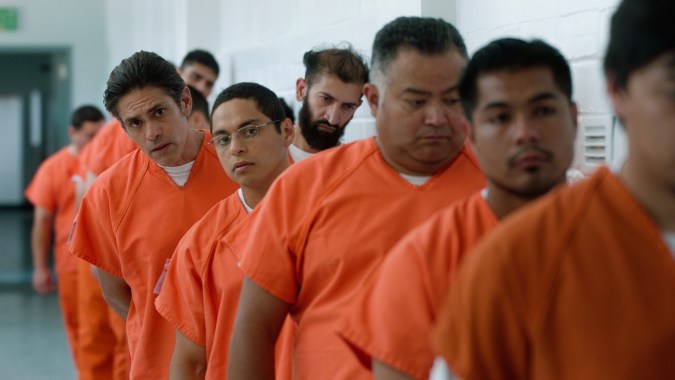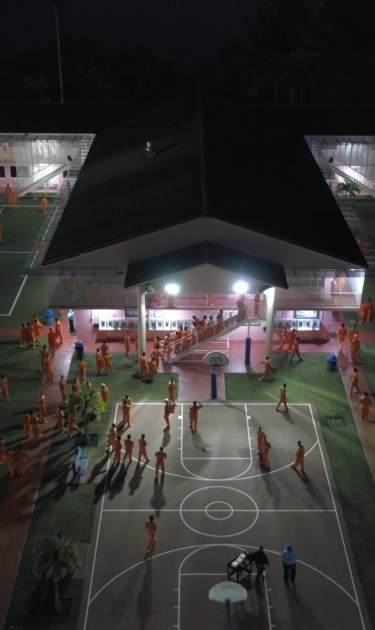The opening shots of Alex Rivera and Cristina Ibarra’s The Infiltrators are washed out night vision images of the U.S. Mexico border. Grayish and ghoulish, they echo the surveillance technology that now pervades such a space in our collective imagination. They are followed by photocopied images of official government documents as we hear how a young man’s mother brought him across the border. We may begin with images that narrow down stories about border-crossing into photos and documents, the kind of evidence used in courts, but that’s only a prologue to a film that fleshes out those stories and stresses the importance of remembering that there are real life people behind every statistic about undocumented immigrants in the United States. “Undocumented … illegal,” the voice-over that opens the film tells us, “I don’t care what you call me. They’re all just different words for ‘afraid.'”
The Infiltrators is first and foremost a film about what it means to be undocumented and unafraid. That rallying cry has emerged in the last few years as a necessary call to action by undocumented activists who, rather than remain silent and on the margins, have made visibility an integral part of their activism. Civil disobedience is not only most effective but safest when it’s done publicly. Making sure to protest out in the open, getting arrested in front of TV cameras — these are their weapons now. And that’s precisely where the spirit of The Infiltrators lies as it follows members of the National Immigrant Youth Alliance, a group of radical DREAMers who are on a mission to stop unjust deportations.
That description, though, makes this film sound like a documentary. Which, for the most part it is: in on-camera interviews we meet Marco Saavedra, Mohammad Abdollahi and Viri Martinez, for example, three DREAMers who have made a commitment to fight injustice against undocumented immigrants. It’s through them that Ibarra and Rivera guide us through the intricate plan they’ve concocted to fulfill their lofty plans. Knowing that knowledge is power and that detention centers like the one in Broward county Florida are black boxes where detainees often get cut off from family, friends and lawyers alike, they’ve decided to infiltrate it.

But by the time we see Marco being dropped off near the Border Patrol building where he’s to let himself be arrested, The Infiltrators shifts gears: we will be following two Marcos. The real one and a fictional one (played by Maynor Alvarado), who’ll lead us inside the ICE detention center and let us see what the real Marco accomplished while inside. These dramatizations, which use recordings to bridge what’s fiction and what’s real, help us see what Marco sees firsthand: the cruelty in those centers as well as the Kafkaesque bureaucratic nightmare they dream up for undocumented immigrants like Claudio Rojas (played by Manuel Uriza), whose sudden arrest has landed him there with seemingly no path to get out. He fears he may stay there for years on end like many of his fellow detainees.

Following these two narrative paths, its documentary stylings letting us into the grassroots organizing taking place outside during the Obama years, and its dramatizations allowing us to see what goes on inside, make The Infiltrators a rare thriller hybrid. The filmmakers have long described it as “Ocean’s 11 set in a detention center” and you see why. There’s a danger to what Marco (and eventually Viri, later played by Vida‘s Chelsea Rendon) are doing: not only do they put their lives at stake but any coordinated effort to help people like Claudio is time-sensitive. Here’s a film that brings the kind of tension you’d find in a bomb-defusing scenes to moments when detainees have to find ways to avoid being boarded on a plane out of the country.
As reports of cruelty and neglect continue to flood headlines about ICE detention centers — most recently, it was revealed that 85% of a group of ICE detainees tested for COVID-19 were positive — The Infiltrators feels more timely and urgent than before. More importantly, the docu-film stresses that collective outrage over these “purgatories,” as Marco refers to them, far predates this newest administration. As both document and chronicle of radical activism, Rivera and Ibarra’s project is a call to action, one that may begin with the inspiring work of Marco and Viri but that can only be sustained by collective organizing long after the credits finish rolling.
The Infiltrators is playing in virtual cinemas right now.





